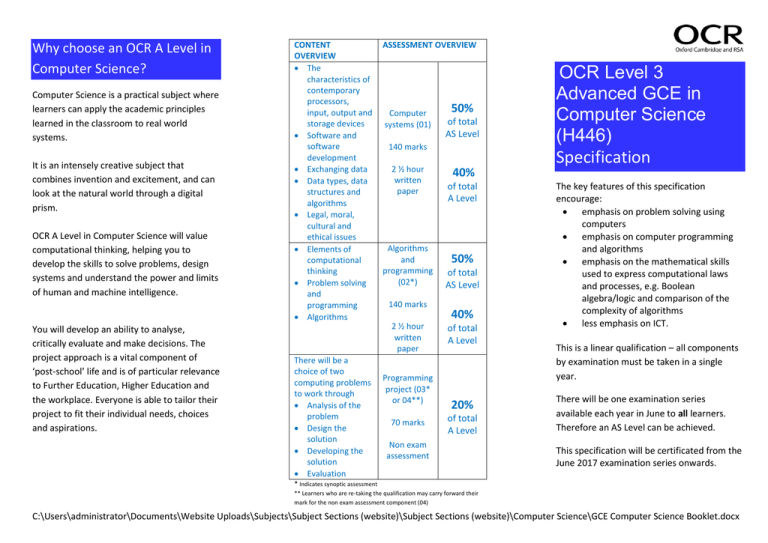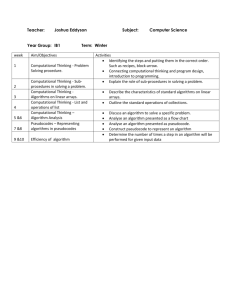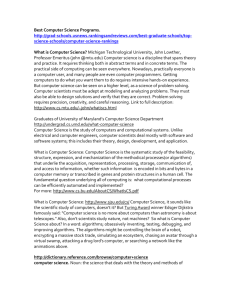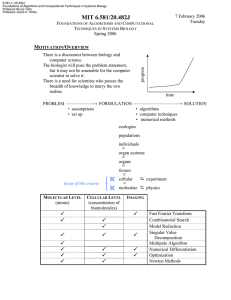GCE Computer Science Booklet - The McAuley Catholic High School
advertisement

Why choose an OCR A Level in Computer Science? Computer Science is a practical subject where learners can apply the academic principles learned in the classroom to real world systems. It is an intensely creative subject that combines invention and excitement, and can look at the natural world through a digital prism. OCR A Level in Computer Science will value computational thinking, helping you to develop the skills to solve problems, design systems and understand the power and limits of human and machine intelligence. You will develop an ability to analyse, critically evaluate and make decisions. The project approach is a vital component of ‘post-school’ life and is of particular relevance to Further Education, Higher Education and the workplace. Everyone is able to tailor their project to fit their individual needs, choices and aspirations. CONTENT OVERVIEW The characteristics of contemporary processors, input, output and storage devices Software and software development Exchanging data Data types, data structures and algorithms Legal, moral, cultural and ethical issues Elements of computational thinking Problem solving and programming Algorithms ASSESSMENT OVERVIEW Computer systems (01) of total AS Level 140 marks 2 ½ hour written paper Algorithms and programming (02*) 140 marks 2 ½ hour written paper There will be a choice of two computing problems to work through Analysis of the problem Design the solution Developing the solution Evaluation 50% Programming project (03* or 04**) 70 marks 40% of total A Level 50% of total AS Level 40% of total A Level 20% of total A Level Non exam assessment OCR Level 3 Advanced GCE in Computer Science (H446) Specification The key features of this specification encourage: emphasis on problem solving using computers emphasis on computer programming and algorithms emphasis on the mathematical skills used to express computational laws and processes, e.g. Boolean algebra/logic and comparison of the complexity of algorithms less emphasis on ICT. This is a linear qualification – all components by examination must be taken in a single year. There will be one examination series available each year in June to all learners. Therefore an AS Level can be achieved. This specification will be certificated from the June 2017 examination series onwards. * Indicates synoptic assessment ** Learners who are re-taking the qualification may carry forward their mark for the non exam assessment component (04) C:\Users\administrator\Documents\Website Uploads\Subjects\Subject Sections (website)\Subject Sections (website)\Computer Science\GCE Computer Science Booklet.docx understand the principles of solving problems by computational methods be able to use algorithms to describe problems be able to analyse a problem by identifying its component parts. Content of Computer systems (Component 01) This will introduce you to the internal workings of the CPU, the exchanging of data and also looks at software development, data types and legal and ethical issues. This knowledge will be used when studying computational thinking, developing programming techniques and devising their own programming approach in the Programming project component (03 or 04). You will be expected to apply the criteria below in different contexts including current and future uses of the technologies. 1.1 The characteristics of contemporary processors, input, output and storage devices 1.2 Software and software development 1.3 Exchanging data 1.4 Data types, data structures and algorithms 1.5 Legal, moral, cultural and ethical issues Content of Algorithms and programming (Component 02) This component will incorporate and build on the knowledge and understanding gained in the Computer systems component (01). In addition, you should: understand what is meant by computational thinking understand the benefits of applying computational thinking to solving a wide variety of problems What careers can Computer Science lead to? Studying A Level Computer Science will enable you to study a range of subjects at university. This subject is highly recognised by 2.1 2.2 2.3 Elements of computational thinking Problem solving and programming Algorithms the Russell Group Universities. Jobs directly related to careers using a degree in computer science include: Content of non exam assessment Programming project (Component 03 or 04) You will be expected to analyse, design, develop, test, evaluate and document a program written in a suitable programming language. The underlying approach to the project is to apply the principles of computational thinking to a practical coding problem. While the project assessment criteria are organised into specific categories, it is anticipated that the final report will document the agile development process and elements for each of the assessment categories will appear throughout the report. 3.1. Analysis of the problem (10 marks) 3.2. Design of the solution (15 marks) 3.3. Developing the solution (25 marks) 3.4. Evaluation (20 marks) Database administrator Games developer Information systems manager IT consultant Multimedia programmer Network engineer Systems analyst Systems developer Jobs where your degree would be useful include: Geographical information systems officer IT sales professional IT trainer Secondary school teacher Technical author This is a challenging, rewarding and highly recognised qualification. C:\Users\administrator\Documents\Website Uploads\Subjects\Subject Sections (website)\Subject Sections (website)\Computer Science\GCE Computer Science Booklet.docx


